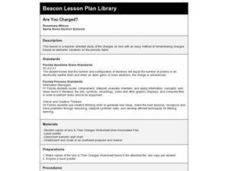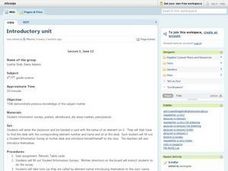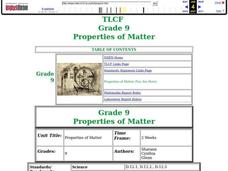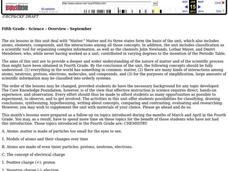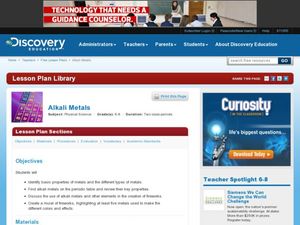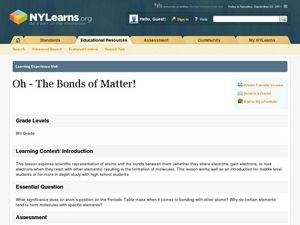Curated OER
Are You Charged?
Fourth graders study the charges on ions and familiarize themselves with a quick way to remember charges based on location of elements on the periodic table. They complete a worksheet and share their answers with the class.
Curated OER
Electronegativity
Young scholars identify the type of bonding between two atoms of elements given their electronegativity values. They study the trend of electronegativity across the periodic table in small groups.
Curated OER
Isotopes of Pennies
Pupils demonstrate that isotopes of an element have different masses. They illustrate atomic mass and neutrons. The periodic table is examined in length. Display of a collection of atoms is surveyed.
Curated OER
Classification is Sweet
Students classify, weight and organize items during this lesson. This lesson works great as or with an introduction of the Periodic Table of Elements.
Curated OER
Metals, Non-metals, Metalloids
Students discuss the physical and chemical properties of metals and non-metals. As a group, they classify items as a metal or non-metal. Using the periodic table chart, students discuss the characteristics of each metal. Based upon...
Chemistry Teacher
Metals, Nonmetals, and Metalloids Lab
What an exciting way to introduce your blossoming chemists to the world of metals, nonmetals, metalloids, and polymers! Here is a lab activity that is designed to allow pupils the opportunity to visualize the reaction of metals,...
Virginia Department of Education
Matter and Energy: Equations and Formulas
Using simple materials, an informative lesson demonstrates the Law of Conservation of Matter and explains how to balance chemical equations. Young chemists perform experiments, analyze reactions, and balance chemical equations on their...
Curated OER
Naming Elements and The Periodic Chart
Students will enter the classroom and be handed a card with the name of an element on it. They will then have to find the desk with the corresponding element number and name and sit at this desk. Each student fills out a Student...
Curated OER
Crystals: What Are They and What Holds Them Together
Students are introduced to the characteristics of crystals and what keeps them together. Using the Periodic Table, they examine the various elements and develop a model of an atom. In groups, they place sugar and salt in petri dishes...
Curated OER
Ionic bonding
Students explore ionic bonding. They draw examples of ionic bonding and explain the activities of the electrons of the elements. Students use paper plates and candy to draw electron configurations of given atoms.
Curated OER
Properties of Matter
Ninth graders explore the molecular structure of matter and how it can affect the physical characteristics of a specific material. They demonstrate that isotopes of an element have different masses. Students demonstrate that the rates of...
Curated OER
Atomic Structure and Quantum Theory
Students are introduced to the structure of an atom and Dalton's atomic theory through a short video and mini-lecture. They also take a look at the weight of mass and become familiar with the idea of quantum theory
Curated OER
Let Us Bond Together
Fourth graders paricipate in a demonstration about bond strengths and bond types.
Curated OER
Matter
Fifth graders investigate the nature of matter and of the scientific processes associated with them in this series of lessons.
Curated OER
Chemistry - Atoms and Elements
Learners perform varied activities as part of a layered curriculum unit: They write and perform a skit that outlines the evolution of the model of the atom. The script is submitted to the teacher for review before performance.
Curated OER
What is Radon?
Learners read an article about radon and its properties. They examine a periodic table and identify the numbers surrounding an element. They discuss the harmful and helpful effects of radiation.
Curated OER
Roll or Attendance
Students stand for roll call in designated spots painted by the teacher. They stand on the alphabet, numbers, periodic table, and keyboard.
Curated OER
Alkali Metals
Middle schoolers explore the unique properties of alkali metals. For this chemistry lesson, students create a mural of fireworks display after researching its different element components. They write a brief description about an alkali...
Curated OER
The Noble Gases
Students identify the different elements that belong to the Noble Gas family. In this chemistry activity, students design a neon sign. They research how they are made and share their work with the class.
Curated OER
Mass Spectrometer
In this mass spectrometer worksheet, high schoolers read about how a mass spectrometer determines the elements in gases around Earth. Students answer 3 questions and identify the elements in a graph found by a mass spectrometer.
Cornell University
What Happens When We Excite Atoms and Molecules?
Excited atoms lead to exciting lessons! Learners use heat and light to excite both atoms and molecules. They display their learning in the form of Bohr models depicting the excited state of the atoms.
Curated OER
Chemistry
Students identify elements on the periodic table and how to read it. They create their own chart for alkali metals and alkaline earth metals. They are evaluated based on a rubric.
Curated OER
Atoms, Kinetic Theory, Solids and Fluids
Students identify and describe the building blocks that make up an atom. They also compare the ages of atoms to the ages of the materials they compose,as well as, give examples that illustrate the small size of atoms.
Curated OER
Oh - The Bonds of Matter!
Eighth graders identify the types of bonds elements form. In this chemistry lesson, 8th graders represent valence electrons with dot structures. They draw and label different atoms.
Other popular searches
- Periodic Table of Elements
- Periodic Table of the Elements
- Periodic Table Elements
- Periodic Table and Elements
- Periodic Table Elements Unit


